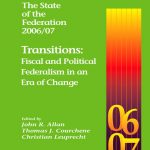Extra Innings
 Christian Leuprecht, assistant professor of political science, Royal Military College of Canada and a fellow of the Institute of Intergovernmental Relations, Queen’s University, co-edited “Canada: The State of the Federation 2006/07 Transitions: Fiscal and Political Federalism in an Era of Change” Canada: The State of the Federation Series Paper 1553391896. The release date was 2008-11-28.
Christian Leuprecht, assistant professor of political science, Royal Military College of Canada and a fellow of the Institute of Intergovernmental Relations, Queen’s University, co-edited “Canada: The State of the Federation 2006/07 Transitions: Fiscal and Political Federalism in an Era of Change” Canada: The State of the Federation Series Paper 1553391896. The release date was 2008-11-28.
Canada: The State of the Federation 2006/07 deals with transitions that have been initiated by a variety of factors and have profound implications. Scholars from several disciplines analyze the implications of these transitional forces, bringing historical, analytical, fiscal, and political perspectives to bear on issues arising from equalization and fiscal imbalance. Contributors examine the ramifications of recent major changes to equalization and show how these changes will have far-reaching and, in some cases, troubling implications. Further transitions arise in the area of federal-provincial relations as a result of Prime Minister Harper’s commitment to “open federalism.” In this context, contributors re-examine the role and use of federal spending power and explore whether the Canadian federation might be better served by a totally new approach to federalism. Finally, the implications of transitions affecting the role and place of cities in the Canadian federation ar e considered. Particular attention is given to the significance of the on-going information revolution, which privileges cities – most importantly “global city regions” – as the new, dynamic drivers of growth, innovation, and trade.
___________________________________________
The Afghanistan Challenge
Hard Realities and Strategic Choices
Andrea Charron, a PhD candidate in the War Studies program. at the Royal Military College of Canada in Kingston, was a contributor to The Afghanistan Challenge Hard Realities and Strategic Choices, edited by Hans-Georg Ehrhart, Charles Pentland release date: 2009-01-01. Canada and Germany are among the largest contributors to the international mission in Afghanistan, with troops in different parts of the country, fulfilling different roles. Canada’s higher ratio of combat to development work is reflected in a higher rate of casualties. Canadians have sometimes joined in criticisms of Germany and other European allies for their unwillingness to take on riskier military tasks in Afghanistan’s southern and eastern provinces. Some Germans, in turn, have chided Canada for stressing war – fighting at the expense of approaches more centred on development. This Canadian-German dialogue reflects a larger debate, both operational and existential, within NATO concerning Afghanistan and the future of the alliance. This collection of essays by leading German and Canadian experts assesses the present state and future prospects of the Afghanistan mission, both to advance the dialogue and to suggest better approaches to the policy questions that continue to confront the alliance.